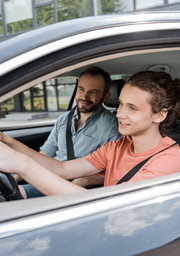Keys to Maturity: How Cars Can Teach Teens Unique Life Lessons
Finally being able to drive a car is a right of passage for just about every teenager. If your teen recently got behind the wheel or is about to, they’ve probably been looking forward to it for years. But, cars can teach teens life lessons about more than just road safety and getting from one place to another.
Vehicle ownership requires a lot of responsibility. Your teen being able to drive themselves places for the first time also puts a lot of weight on their shoulders, but that can be a good thing when you use those responsibilities as teachable moments.
So, while it’s great for your teen to be excited about getting a car and driving, don’t hesitate to teach them about the positive impact car ownership can have on their personal development. This can also encourage you, as a parent, to feel better about your teen getting behind the wheel.
Financial Responsibility
One of the first things your teenager will have to learn about purchasing and owning a car is the financial responsibility that comes with it. Even if you helped them out by gifting them a vehicle or paying for some of it, buying a car is really only the beginning. There are plenty of additional expenses to consider, including:
- Fuel costs
- Maintenance
- Insurance
Talk to your teen about value-driven spending. It can be tempting for a new driver to want to get out as much as possible. For a teenager, that might include things like going to the movies with their friends every weekend, heading to a local fast food spot after school, or planning a road trip over spring break.
While there’s nothing wrong with those ideas, they can deplete your teenager’s funds quickly, leaving them with financial stress. Value-driven spending focuses on the things that matter most. Ask your teenager to break down their spending categories and determine which things are wants and needs. This is a good way to start building a budget with your teenager. It teaches them to take a look at where their money is going, where they can cut back, and how they can make the most of what they have.
Problem-Solving and Decision-Making
When your teen went through driver’s education to get their license, they had to learn a lot about making smart, quick decisions behind the wheel. While safety should be a top priority for your teenager, driving also gives them the opportunity to make decisions even when they’re not on the road.
As a parent, one of the best things you can do is to set clear expectations about your teenager and their car. Those expectations should include how often they can use the car, curfews, and where they can go. With those boundaries in place, it’s up to your teen driver to make smart decisions — sometimes at a moment’s notice. They have to prove that they can keep a curfew, stay in the safe parts of town, and use the car responsibly.
They’ll also have to learn how to solve problems that might come up with the car. What will they do if they get a flat tire while driving home? Who can they call if the “check engine” light comes on? Granted, it’s important for you to be able to help and guide them as they work through these problems. But, don’t solve every issue for them.
Giving them guidance and letting them solve real-world problems on their own will improve their decision-making skills. It will also help to boost their confidence, which can help their overall mental well-being. Building self-esteem now can help your teenager stand more firmly in who they are when they’re out on their own for the first time.
Moreover, if they learn how to fix mechanical issues that pop up, it can do even more than increase their self-esteem. Your teen’s interest in the workings of their vehicle could turn into a fascination with mechanical engineering or another STEM field as they grow older. Given that it’s important to boost participation in STEM, your teen’s experience with the mechanics of their car could see them excelling in a focus that is essential to the workings of society in general.
Depending on the type of car your teen has, you might be able to fine-tune the lessons you can teach them. For example, driving a truck is different from zooming around in a sports car. Teaching your teen how to properly drive a truck might include focusing on specific maintenance, accounting for the size of the vehicle while driving, and ensuring they understand the different parts of the vehicle.
It might seem overwhelming, at first, but helping your teenager understand these things can serve as a bonding opportunity for you, and it will give them the information they need to make decisions about their vehicle on their own if a problem arises.
Enforcing Accountability
Owning a vehicle can teach your teenager the importance of accountability. Being able to drive often means being able to take themselves to school, work, and extracurricular activities. They’ll be responsible for getting themselves to those places on time.
If they’ve struggled with time management in the past, owning a car can help them learn the importance of getting themselves ready sooner, knowing when they need to leave, and understanding how they can make the most of their schedule.
The most important thing you can teach your teen about driving is that it’s a privilege. They’ll learn plenty of life lessons behind the wheel, from keeping themselves and others safe to understanding the impact that driving will have on their lives. Keep the conversation open, and make sure you’re always available to guide them as they start this new chapter. It’s a big step into adulthood, and it’s essential not to ignore the life lessons that will naturally come from it.
About the Author
 Katie Brenneman is a passionate writer specializing in education, mental health, family lifestyle and online safety. When she isn’t writing, you can find her with her nose buried in a book or hiking with her dog, Charlie. You can follow her on Twitter.
Katie Brenneman is a passionate writer specializing in education, mental health, family lifestyle and online safety. When she isn’t writing, you can find her with her nose buried in a book or hiking with her dog, Charlie. You can follow her on Twitter.




